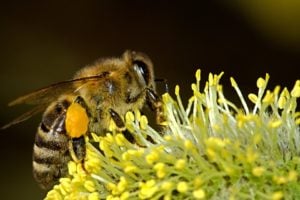New Analysis: Curbing Pesticides Key to Reversing Insect Apocalypse
More Than 40 Percent of World's Insect Species on Fast-track to Extinction

Authors of a major new scientific review of the catastrophic decline of insects say a “serious reduction in pesticide usage” is key to preventing the extinction of up to 41 percent of the world’s insects within the “next few” decades.
The review, published online this week in Biological Conservation, highlights that reversing the insect declines will require an “urgent” push to replace the ever-escalating use of harmful synthetic pesticides and fertilizers with more ecologically based, sustainable farming practices.
“This analysis is an alarming wake-up call that we need to dramatically reduce pesticide use,” said Tara Cornelisse, an entomologist and senior scientist at the Center for Biological Diversity. “Dumping more and more insecticides on our food crops is like fixing a noise under the hood by yanking out the car’s engine. Insects are the foundation of every healthy ecosystem, so we need to quit poisoning landscapes with millions of pounds of toxic pesticides every year.”
Among the authors’ most sweeping conclusions is that
“A rethinking of current agricultural practices, in particular a serious reduction in pesticide usage and its substitution with more sustainable, ecologically-based practices, is urgently needed to slow or reverse current trends, allow the recovery of declining insect populations and safeguard the vital ecosystem services they provide.”
The meta-analysis of 73 studies assessing insect declines over a period of at least 10 years found that industrial farming practices driving habitat loss and extensive use of pesticides and fertilizers is associated with 47 percent of reported declines.
The authors found clear evidence for decline in all insect groups reviewed, but especially for butterflies and moths, native bees, beetles, and aquatic insects like dragonflies. It is estimated that half of butterflies, moths and beetles are declining at about 2 percent per year, and one in six bee species has disappeared in many regions.
A growing body of research indicates that insects are declining about twice as fast as vertebrates.
Earlier studies of insect loss showed declines of insect specialists — those that need specific habitat for nesting, or pollinate only one type of flower. But more and more studies are now documenting large-scale insect loss that includes generalist species, like the endangered rusty patched bumble bee, that were once common throughout their range.
The decline of widely ranging generalist insect species shows that habitat loss, alone, is not enough to explain insect declines. Mounting evidence now demonstrates that a significant driver is the widespread use of pesticides and fertilizers.
“We know neonicotinoid pesticides are a major cause of bee decline and are working to ban them, but this review highlights the urgent need for sweeping pesticide reform,” Cornelisse said. “That reform must start with the EPA replacing its long, troubling embrace of pesticide makers with a truly independent review process for assessing these dangerous poisons.”
*
Note to readers: please click the share buttons above. Forward this article to your email lists. Crosspost on your blog site, internet forums. etc.

